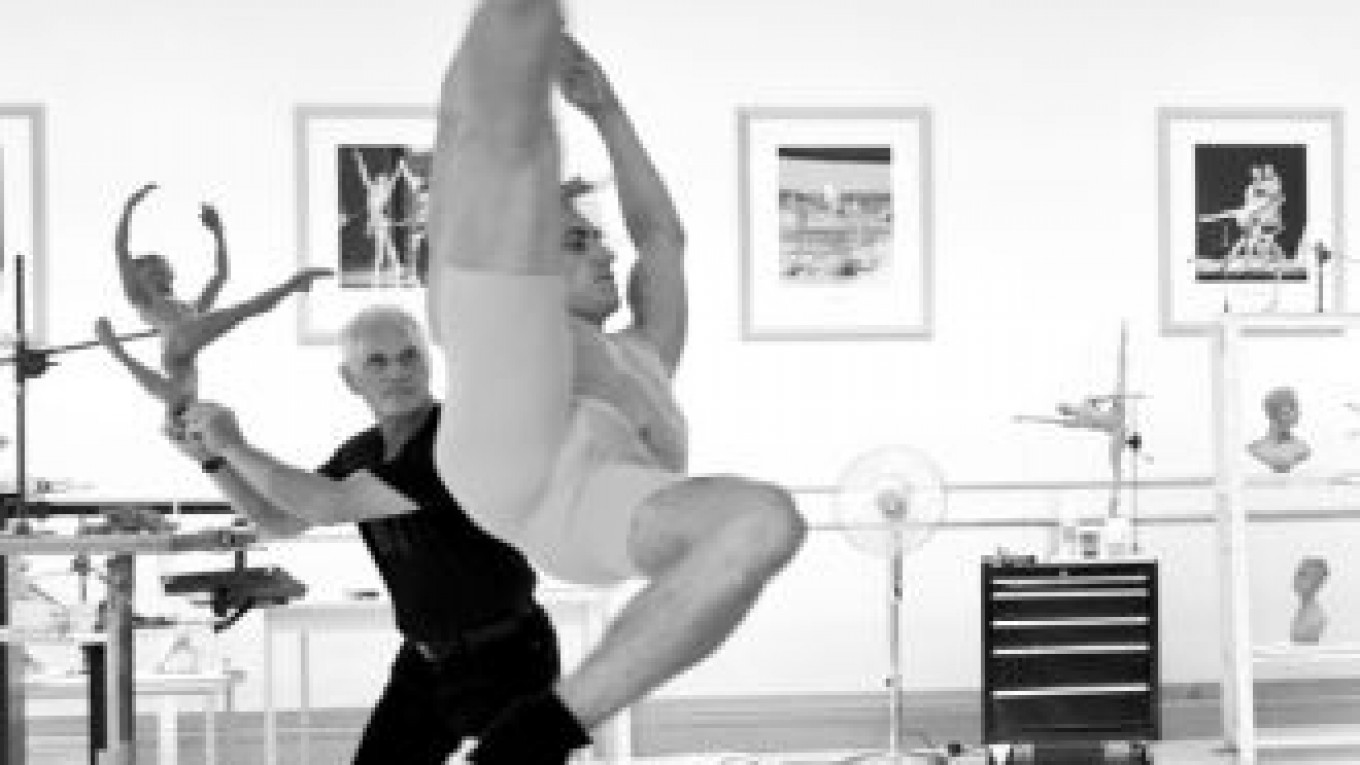Last July, Moscow ballet goers were almost completely taken by surprise at the appearance on the stage of the Stanislavsky and Nemirovich-Danchenko Musical Theater of Ukrainian-born Sergei Polunin, dancing the role of Franz in the theater's new production of Leo Delibes'"Coppelia." Just six months earlier, Polunin had caused consternation in London by abruptly resigning from its Royal Ballet, barely a year and a half after becoming, at age 20, the company's youngest-ever principal dancer.
According to press reports, Polunin was fed up with the Royal Ballet's routine and with dancing in general and had in mind becoming a movie actor.
After a few months adrift, Polunin was taken in hand by Stanislavsky and Nemirovich-Danchenko artistic director Igor Zalensky, himself once a ballet star of the first magnitude. And accepting Zalensky as his mentor, Polunin agreed to dance with Zalensky's Moscow troupe.
Though the role of Franz offered little scope for virtuoso display, it did allow Polunin to produce enough in the way of elegant, seemingly effortless movement to mark him as one of the most gifted dancers to be seen anywhere in the world today.
Most observers with whom I spoke expected Polunin's stay at the Stanislavsky and Nemirovich-Danchenko to be very brief. A dancer with such extraordinary talent seemed almost certain to be snapped up by some more prestigious company. But presumably thanks to Zalensky's influence, Polunin has remained with the Moscow troupe throughout the entire current season.
After taking on other lead roles in the Stanislavsky and Nemirovich-Danchenko's classical ballet repertoire, notably Prince Siegfried in "Swan Lake" and Basil in "Don Quixote," the dancer faced an even greater challenge in mastering the part of Crown Prince Rudolf in Kenneth MacMillan's ballet "Mayerling" for its premiere at the theater in March. But master it he did, with a result that was quite simply one of the most thrilling displays of virtuoso dancing I have ever witnessed.
MacMillan joined the Sadler's Wells (later the Royal) Ballet in 1946 and remained with it, except for a brief time, until his death in 1992, first as a dancer, then as a choreographer and, for seven years, its director. "Mayerling" was created in 1978 and was seen once before in Moscow, on a visit by the Royal Ballet a decade ago.
The ballet takes a page from history and relates the most widely accepted version of the events leading up to the death on January 30, 1889, of the 30-year-old heir apparent to the throne of Austria-Hungary, and his 17-year-old mistress, Baroness Mary Vechora, at the imperial hunting lodge of Mayerling, located not far from Vienna.
The results of the official investigation into the deaths at Mayerling were never made public. But it is generally believed that Crown Prince Rudolf, having shown signs of metal instability, shot his mistress and then committed suicide. That, at least, is the version of events adopted by Macmillan, as well as being used as the basis for at least a dozen musicals and movies, including among the latter a 1957 made-for-TV production that featured Audrey Hepburn and Mel Ferrer and a 1968 film with Catherine Deneuve and Omar Sharif playing Mary and Rudolf.
Julie Lincoln, a veteran of the Royal Ballet who worked directly with MacMillan, has very successfully recreated MacMillan's choreography for the Stanislavsky and Nemirovich-Danchenko. The theater's sumptuous period sets and extravagant period costumes have been copied from Nicholas Georgiadis' designs for the original London production.
Three different casts appeared at the premiere of "Mayerling" in March, of which I managed to see two. The second of them featured artistic director Zalensky, who danced a very polished Rudolf, though, with the dancer now well into his 40s, one that understandably lacked the thrills of Polunin's performance.
The many other soloists who appeared in each cast danced to a generally high standard, and the ballet's score, a compilation of orchestral works by Franz Liszt, was very well played by the theater's orchestra under the baton of Anton Grishanin.
"Mayerling" closes the Stanislavsky and Nemirovich-Danchenko's season on Saturday and Sunday, with Polunin scheduled to dance in Sunday's performance.
The third cast, which I failed to see, is due to perform on Saturday and looks to be more than adequate, at least on paper. But given only one chance to see "Mayerling," I would certainly opt for Polunin. His daredevil dancing in the scene leading up to the murder and suicide provided the best moments of ballet I have witnessed all season. And taken together the rest of what he has done over the past year, I would call him the finest male dancer in my experience since the Mikhail Baryshnikov I saw 30 and more years ago.
"Mayerling" plays July 27 and 28 at 7 p.m. at the Stanislavsky and Nemirovich-Danchenko Musical Theater, located at 17 Ulitsa Bolshaya Dmitrovka. Metro Chekhovskaya. Tel. 495-723-7325. stanmus.ru.
Contact the author at artsreporter@imedia.ru
A Message from The Moscow Times:
Dear readers,
We are facing unprecedented challenges. Russia's Prosecutor General's Office has designated The Moscow Times as an "undesirable" organization, criminalizing our work and putting our staff at risk of prosecution. This follows our earlier unjust labeling as a "foreign agent."
These actions are direct attempts to silence independent journalism in Russia. The authorities claim our work "discredits the decisions of the Russian leadership." We see things differently: we strive to provide accurate, unbiased reporting on Russia.
We, the journalists of The Moscow Times, refuse to be silenced. But to continue our work, we need your help.
Your support, no matter how small, makes a world of difference. If you can, please support us monthly starting from just $2. It's quick to set up, and every contribution makes a significant impact.
By supporting The Moscow Times, you're defending open, independent journalism in the face of repression. Thank you for standing with us.
Remind me later.






